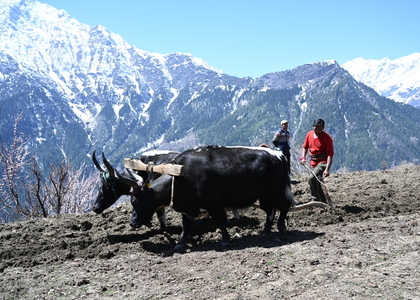Himachal farmers promoting cow dung, buttermilk for natural farming in mountainous terrain
By IANS | Updated: April 26, 2025 20:22 IST2025-04-26T20:19:25+5:302025-04-26T20:22:15+5:30
Shimla, April 26 Dung of indigenous cow, containing 300 to 500 times more beneficial microorganisms compared to other ...

Himachal farmers promoting cow dung, buttermilk for natural farming in mountainous terrain
Shimla, April 26 Dung of indigenous cow, containing 300 to 500 times more beneficial microorganisms compared to other livestock, and homemade inputs like sour buttermilk sprays are being preferred for natural farming in the mountainous Pangi Valley of Himachal Pradesh’s Chamba district, nestled amidst the Pir Panjal range, where cropping is being done by traditional methods for sustainable ecosystem.
Around 25,000 people residing in 19 panchayats of the Pangi Valley, which faces harsh climatic conditions, are largely dependent on agriculture and horticulture for their livelihood. Traditional farming methods often expose crops to the risk of diseases.
However, natural farming practices, which they are opting for now, not only offer better protection against natural threats but also enhance crop yield, resulting in increased income, the government said on Saturday.
The villagers, settled along the banks of the Chandrabhaga river, are elated with the announcement of making Pangi the state's first natural farming sub-division. Although traditional farming methods have been practised in Pangi for centuries but the adoption of natural farming techniques is expected to significantly enhance the economic prosperity of local farmers and orchardists, believes the government.
The declaration of the first natural farming subdivision was made by Chief Minister Sukhvinder Sukhu this month. Since then, the district administration has accelerated efforts to implement this decision on the ground.
Responding to the government initiative, woman farmer Ratto Devi, a resident of Bhatwas village, who adopted natural farming two years ago, said their ancestors too refrained from using chemicals in agriculture and even today they avoid chemical fertilisers, pesticides or any synthetic treatments for farming.
She said spraying of ‘ghanjivamrit’ (a natural bio-enhancer) has significantly improved crop production.
Similarly, another woman farmer, Savitri Devi of Punto village, said all the inputs required for natural farming are readily available at home. She said that preparations like ‘ghanjivamrit’ and ‘jivamrit’ are used to enhance soil fertility and crop productivity.
A core requirement of natural farming is the indigenous Indian cow. To protect crops from fungal infections and pests, natural concoctions like sour buttermilk sprays, ‘kannai astra’ and ‘agni astra’ are being used.
She expresses hope that the establishment of a natural farming subdivision by the government will not only promote natural farming across the valley but also substantially enhance the income of farmers and orchardists.
With the formation of the current government in 2022, multiple initiatives have been undertaken to promote natural farming in the Pangi Valley.
Currently, natural farming is being practised on approximately 400 hectares, and over 2,100 farmers have been trained in this agricultural method.
Block Training Manager Pali said chemical farming was historically never practised in the region.
As of now, 90 per cent of the cultivated land is under agriculture, while the remaining 10 per cent is covered under horticulture activities. With the efforts of the government, a Farmer Producer Organisation (FPO) comprising natural farming practitioners has been established.
Through this FPO, apples are being sold at a rate of Rs 75 per kg, while farmers are also receiving fair prices for crops like kidney beans (rajmah), potatoes and peas. The creation of the natural farming subdivision will further benefit the farmers of the region, according to agriculture experts.
At the state-level Himachal Day celebrations in Pangi this month, the Chief Minister declared a support price of Rs 60 per kg for barley crops cultivated through natural farming methods.
--IANS
vg/dan
Disclaimer: This post has been auto-published from an agency feed without any modifications to the text and has not been reviewed by an editor
Open in app